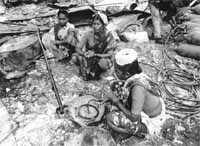Steelborn
 in his budget speech on February 27,1999, Union finance minister Yashwant Sinha announced the abolition of the five per cent additional customs duty on all foreign ships that are brought to the country for scrapping. Obviously, the government is trying to boost the scrap steel industry. This particular step might have been lauded as a good move, since the national economy is not exactly shipshape, and every such step will help it limp, if not run, ahead. Unfortunately, there is a darker side to the scrap steel story, though not many are aware of it.
in his budget speech on February 27,1999, Union finance minister Yashwant Sinha announced the abolition of the five per cent additional customs duty on all foreign ships that are brought to the country for scrapping. Obviously, the government is trying to boost the scrap steel industry. This particular step might have been lauded as a good move, since the national economy is not exactly shipshape, and every such step will help it limp, if not run, ahead. Unfortunately, there is a darker side to the scrap steel story, though not many are aware of it.
Most of the scrap steel India produces comes from Alang, a small coastal town in Gujarat. In fact, Alang produces 2.6 million tonnes of scrap steel every year, which is equal to 15 per cent of the country's total steel production. But the scrap steel from Alang is tainted by the blood of a hundred workers. Alang houses the world's largest ship-breaking yard, where hundreds of poorly trained workers reduce ships to scrap. They work in an extremely treacherous environment and live in sub-human conditions. A recent study by Frank Hittal, occupational health officer, German state of Bremen, confirms that every fourth worker at Alang is expected to develop cancer due to the total lack of safeguards in handling the contaminants. The workers inhale a variety of fumes that include dioxins, polycyclic aromatic hydrocarbons ( pahs ) and biocide tributyl ( tbt ).
Over 40,000 workers in Alang face enormous risks today. Hittal's study says Alang workers are also exposed on a regular basis to poisonous heavy metals, asbestos and several carcinogenic materials. Worse still, the ships often come to Alang with their hazardous cargo, such as explosive gases or toxic chemicals, intact. This explains the frequent accidents and explosions that workers have to live with.
From Alang, the scrap steel is sent to rolling mills and mini steel plants across the country for further processing. Sometimes, the steel is sold directly to buyers with all the toxic paints and contaminants untouched. The irony of Alang's workers is that the steel they produce, sometimes with their lives, is far cheaper than that made by the Indian steel industry. While a kg of conventional steel is priced at Rs 18, Alang sells its scrap steel for a meagre Rs 8 to Rs 10 per kg.
An official at the Metallurgical and Engineering Consultants (India) Limited ( mecon ), New Delhi, says as the scrap steel plates from Alang retain all their contaminants, they expose other rolling mills and steel plant workers to similar health risks. Thousands of these workers inhale these carcinogenic fumes while the steel is processed and cut into plates of various shapes. It is then used in building and bridge construction.
"These companies hardly have proper emission control technologies. And most of the Indian rolling mills do not have any means to control emissions,' says T C Bhadvar, general manager (projects), Indo Mag steel technology limited, commenting on the plants that acquire their steel from Alang. These industries are located mainly in the states of Punjab and Rajasthan, and in Faridabad, Mumbai, Bhavnagar, Nagpur and Pune, he adds. In Punjab alone, there are some 150 rolling mills in Mandi, Govindgarh, Ambala and Ludhiana.
The government, however, is unconcerned. And Sinha's announcement only corroborates its apathy. "If the environmental cost is included, then (the five per cent cut) is not acceptable. The government must pass on some of the benefits for improving the environment and working conditions of the ship-breaking yards,' says Ravi Agarwal, director, Srishti, a non-governmental organisation ( ngo ).
But the government is not listening. Since its inception in 1982, Alang has been a safe haven for scrapping ships. The industry scrapped a record 348 ships in 1996-97 and 347 ships in 1997-98.
Several groups and ngo s have spoken to the Union ministry of environment and forests regarding the hazards associated with ship-breaking, but to no avail. The Basel Ban, part of the Basel Convention on the Control of Transboundary Movement of Hazardous Wastes, prohibits the shipment of such substances from countries that are members of the Organisation of Economic Cooperation and Development ( oecd ) to non- oecd countries. The oecd consists of industrialised countries. According to the Supreme Court's decision on May 5, 1997, "No import should be made or permitted by any authority or any person of any hazardous waste which is already banned under the Basel Convention or to be banned hereafter with effect from the date specified therein.'
However, Hittal's recent study confirms that ships are being brought to Alang, flouting all environmental and safety norms. Asbestos-handling and torch-cutting, for example, are highly hazardous activities strictly regulated in industrialised countries. In Germany, for instance, only fully protected and trained personnel operating under the supervision of skilled specialists are allowed to perform these operations. "For ships already in Asia, this practice should be immediately enforced by the governments in the interest of their workers' health,' says Judit Kanthak, a chemical engineer, who is with the environment pressure group, Greenpeace. But the government, like in the past, maintains its indifference.
